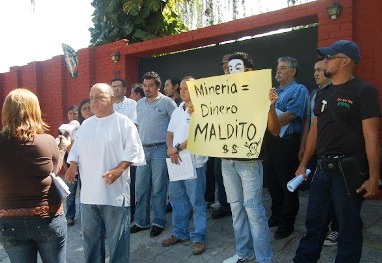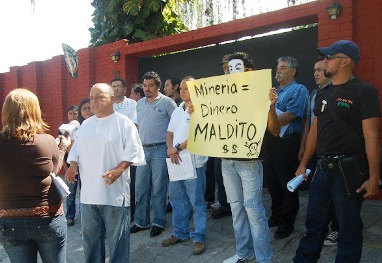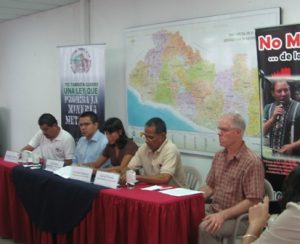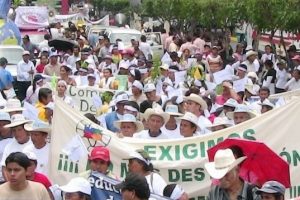Defending Natural Resources, Sister Cities
Anti-Mining Update: Solidarity with Panama and The Social Costs of the ICSID Trial
1. The Costs of ICSID Arbitration and the Consequences for Social Rights in El Salvador (See Below)
2. Salvadoran Activists Hold Protest in Solidarity with Indigenous Mining Resisters in Panama
By Jan Morrill, International Allies Against Metallic Mining in El Salvador
On February 10th, as clashes continued between the government of Panama and indigenous groups resisting hydro-electric dams and mining project on their territory, the National Roundtable Against Mining in El Salvador organized a protest in front of the Panamanian Embassy in San Salvador to express their worry and outrage about the situation. In a press statement representatives from Roundtable said “We, Salvadorans who have organized to resist the advance of the extractive industrial model that preys on the environment, raise our voice in solidarity with our Ngäbe Buglé brothers and sisters who are being repressed and say that their struggle is also our struggle.”
The government repression in Panama, which resulted in the deaths of two anti-mining protesters, has contributed to the increasing unpopularity of the Panamanian President, Ricardo Martinelli, whose popularity has fallen 40 points over the last 11 months. Negotiations have continued between the Ngäbe Buglé and the government and some sources say that the government has agreed to ban mining in the area, but does not want to ban the construction of hydro-electric dams. The government is proposing a referendum on the issue for the next elections, but the indigenous groups claim that this is just a delaying tactic.

The Salvadoran and Panamanian anti-mining movements are connected by the fact that Canadian mining company, Pacific Rim is pursuing mining projects in both countries. When the company’s El Salvador project were complicated by the strong resistance of the social movement, Pacific Rim began to invest in a project in Panama. While this project is not located in the Ngäbe Buglé territory, it represents a threat to the lives and environment of all Panamanians.
The protest in San Salvador wasn’t the only of its kind. Both the Movimiento Mesoamericano contra el Model Extractivo Minero and the Red Mexicana de Afectados por la Mineria issued statements condemning and calling for an end to repression. The same week, activists also held protests in Costa Rica and Guatemala .
At the protest in front of the Panamanian Embassy in San Salvador, activists held a press conference and attempted to present their declaration in solidarity with the Ngäbe Buglé struggle to Embassy officials. The officials at first refused to accept the declaration, claiming that the building was closed and that no one could receive the letter. After calling in at least 15 police officers, the Charge d’Affiares of the Embassy finally received the statement through a slot in the Embassy door.
Check out these links to see more photos from the protest and for coverage of the activity in Spanish on Telesur and in the CoLatino newspaper.
The Costs of ICSID Arbitration and the Consequences for Social Rights in El Salvador
February, 2012
By the Foundation for Studies on the Application of Law (FESPAD, a Member of the National Roundtable on Metallic Mining in El Salvador)[1] [2] Originally posted in English on justinvestment.org.
The legal proceedings initiated by the mining company Pacific Rim[3] against the Salvadoran state before the International Center for the Settlement of Investment Disputes (ICSID), is today waiting on a resolution. This is because the three arbiters who will decide the case have been given the task of deliberating at length over the last round of jurisdictional objections put forth by El Salvador. The fact that Pacific Rim has created a subsidiary in the state of Nevada, three years after the beginning of its conflict with El Salvador, to then later claim that it has the right to recourse under the DR-CAFTA, might be considered a form of fraud. The tribunal should take this fact carefully into consideration.
We expect this decision to be given in the next few days.
At this stage in the process, the best scenario for El Salvador would be a decision on the jurisdictional objections that favors it, and would mean that the case is dismissed. The worst scenario for El Salvador would be that the tribunal allows the proceedings to continue to the next stage, in which both parties would present their charges and defense, and in which responsibilities would then be established.
Pacific Rim demands indemnity for 77 million USD in return for its investment in El Salvador, and the number could reach hundreds of millions of dollars. This is because the company claims that its stock lost value after the permit for a mining concession was denied.
It must be remembered that El Salvador has been placed twice in the defense seat at supranational tribunals. The first occasion was the case presented in mid-2009 by the mining company Commerce Group, with allegations that the country had no legal basis for denying it permits for mineral exploration. Commerce Group demanded compensation of 100 million dollars, along with the re-instatement of its revoked environmental permits, without which the mining project could never exist. The decision came in March of 2011 that this case would not be accepted by ICSID. Regardless, the phase of preliminary objections cost El Salvador 800,000 USD in legal fees.
In the Pacific Rim case, which was also presented in mid-2009 and was accepted somewhat later by ICSID, El Salvador has continued the process of placing objections, which has prolonged the proceedings at a considerable cost. The cost of this case for El Salvador has been estimated at 4.3 million USD. This means that in defending itself against these two cases, El Salvador has already spent a total of over 5 million USD. For El Salvador, a country with very few financial resources, to be paying millions in arbitration, it has the effect of deepening the precariousness for the lives of people whom the state protects the least. It is extremely difficult for our country to assume these costs for arbitration, and the costs have serious economic and social implications for the people of El Salvador.
As one example, those five million USD would have provided one year worth of adult literacy classes for 140,000 people[4].
Those five million USD could have doubled the amounts of scholarships available to middle school students[5].
Five million USD are equal to what the government invests every year in infrastructure and public schools that benefit 384,615 students[6].
The five million USD paid in arbitration are approximately a third of what the government invests in the provision of food for Salvadoran students[7].
The five million USD paid in arbitration equal the full sum of what the government would invest in order to give each public school student a glass of milk every day, to support their nutritional development.
Five million USD in arbitration would cover a fifth of what the government needs to develop its 2012 vaccination program.
Five million USD could serve to feed 60,570 families in temporary housing for a full two weeks during a natural disaster[8].
If this and more can be accomplished with five million USD, how much more could be accomplished with the 77 million USD that Pacific Rim is demanding, or the hundreds of millions it could win from El Salvador?
It is for this very reason that in December of 2011, civil society organizations representing millions of people in El Salvador, the United States, Canada and the world, submitted a petition to ICSID and the World Bank (where the trade tribunal is housed) that asks for respect for domestic judicial processes, the sovereignty of El Salvador, and to have the Pacific Rim case dismissed. We are waiting.
[1] With the support of Jan Morrill. Translation by Lela Singh.
[2] Fundación de Estudios para la Aplicación del Derecho (FESPAD). www.fespad.org.sv
[3] Company of Canadian capital incorporated in the Cayman Islands until 2007 when it moved to the United States to benefit from the DR-CAFTA.
[4] This calculation is made with the data that in 2010 the government spent $2 million on literacy classes for 56,000 people
[5] In 2011 the government spent 6 million USD for scholarships to middle level education students.
[6] in 2012 the government will give either $13 or $25 per student to each school for materials and infrastructure. The difference in price depends on the type of school the student attends
[7] the 2012 govt has $15.5 dedicated for the school lunch and snack program
[8] the worst natural disaster in Salvadoran history was the tropical depression that hit in October of 2011. It caused over $650 million in damages and took 34 lives



